2018秋牛津深圳版(广州沈阳通用)七年级英语上册课件:Module 1 My life Unit 2 daily life共88张PPT
文档属性
| 名称 | 2018秋牛津深圳版(广州沈阳通用)七年级英语上册课件:Module 1 My life Unit 2 daily life共88张PPT |
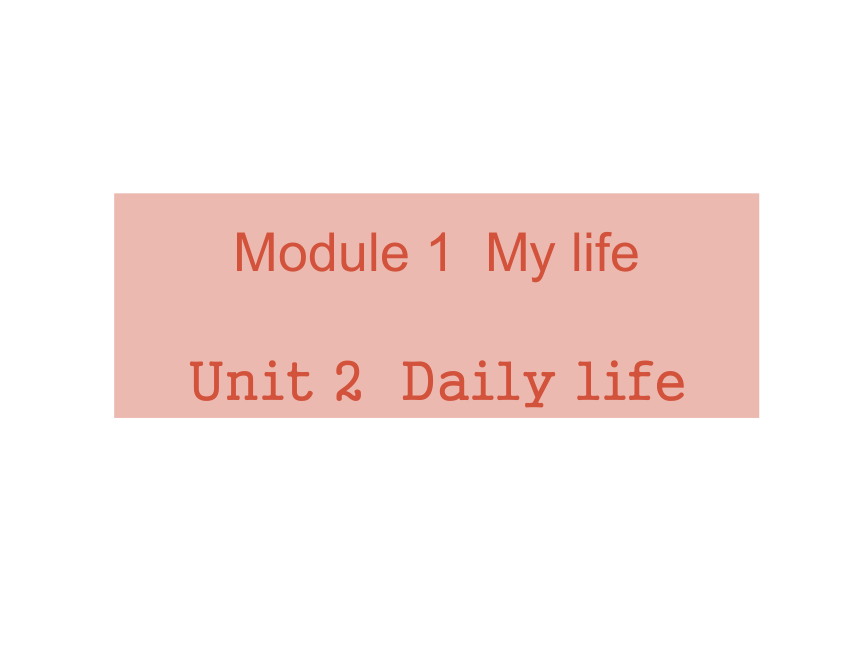
|
|
| 格式 | zip | ||
| 文件大小 | 790.8KB | ||
| 资源类型 | 教案 | ||
| 版本资源 | 牛津深圳版 | ||
| 科目 | 英语 | ||
| 更新时间 | 2019-01-23 00:00:00 | ||
图片预览

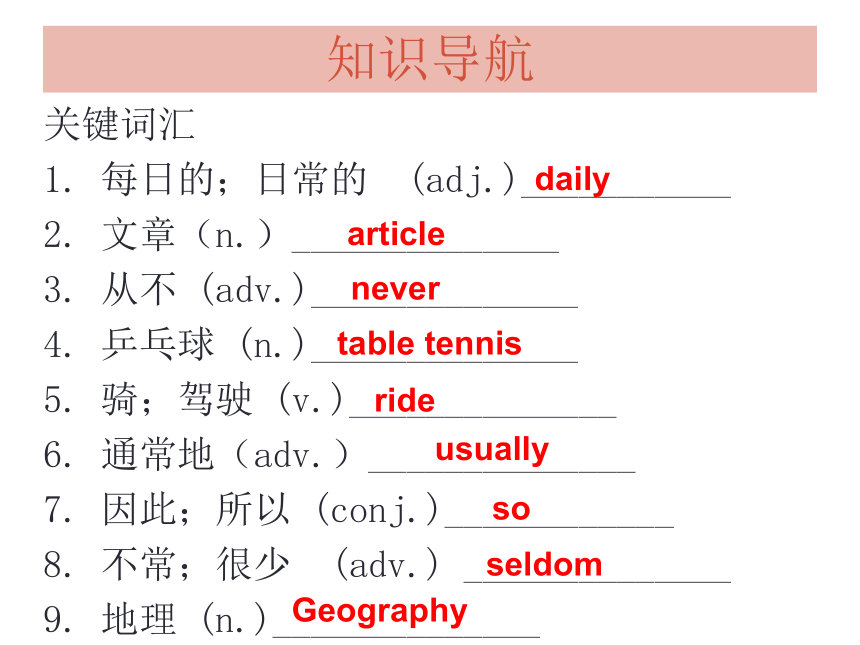
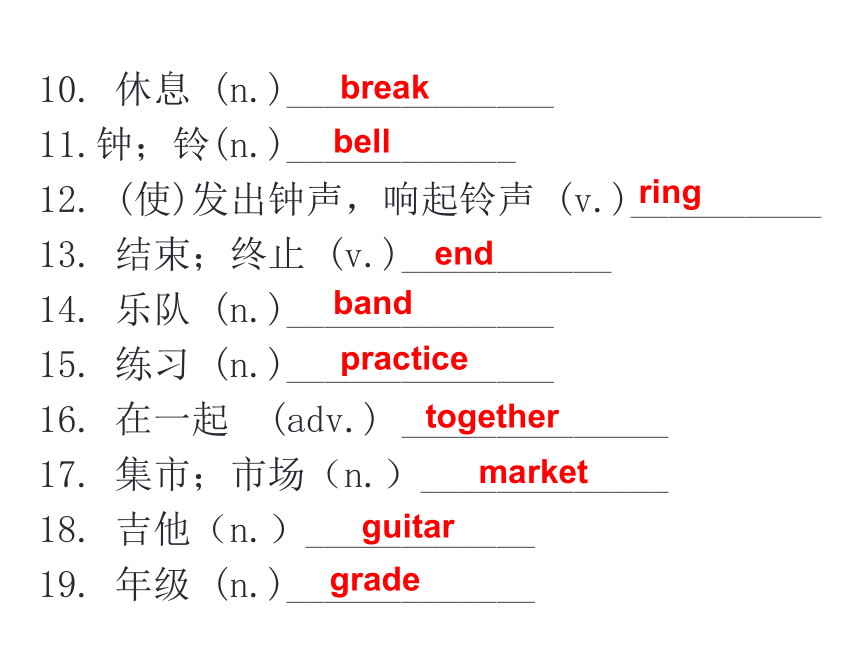
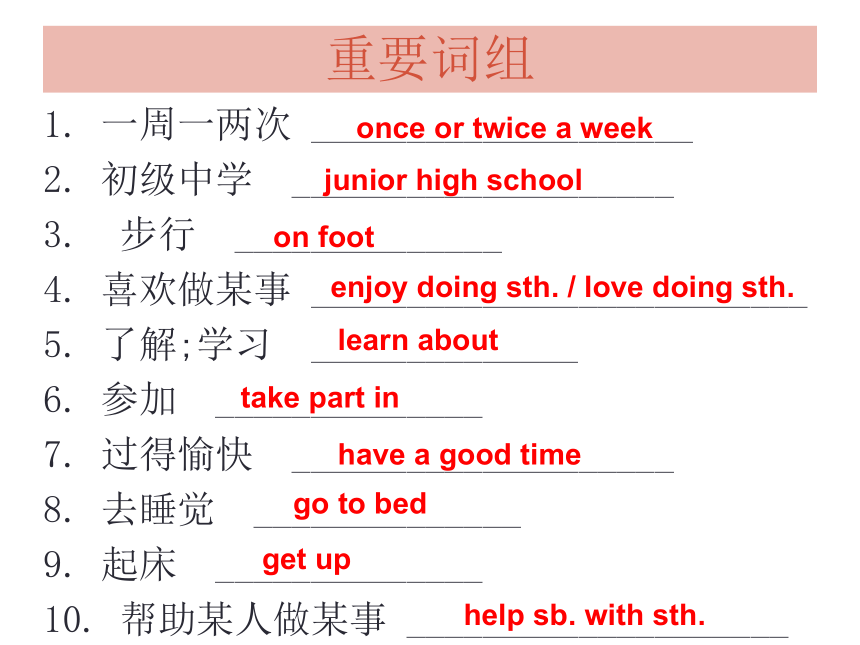
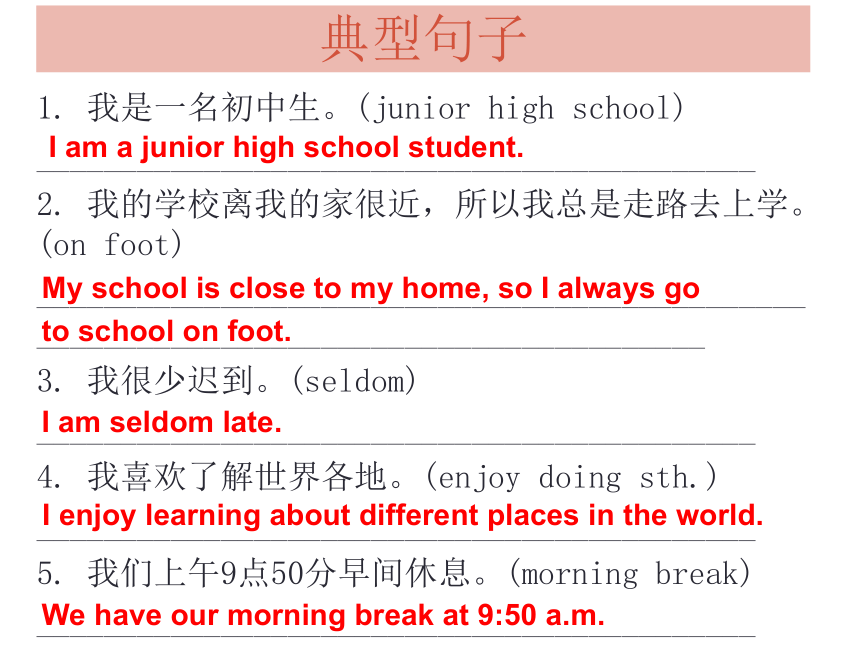
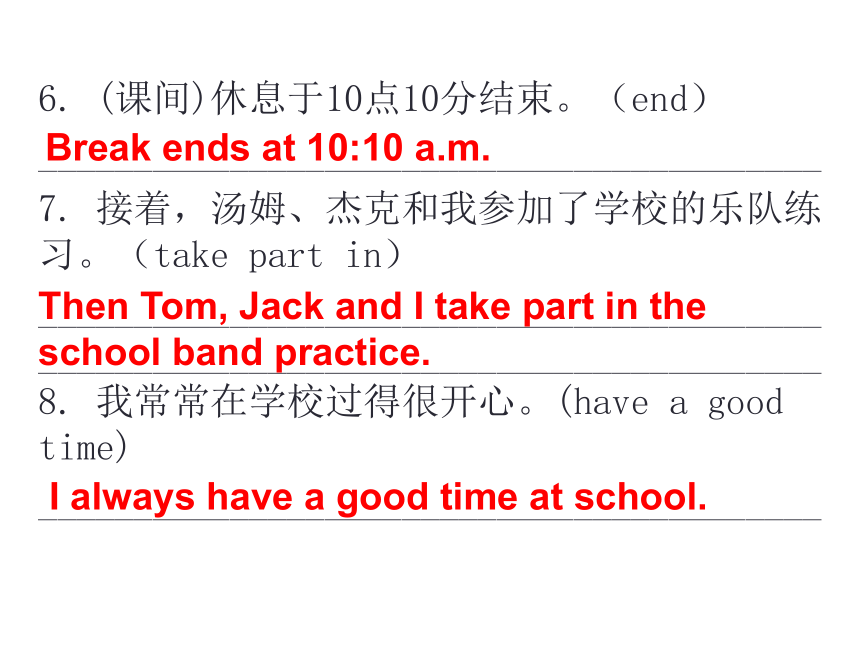
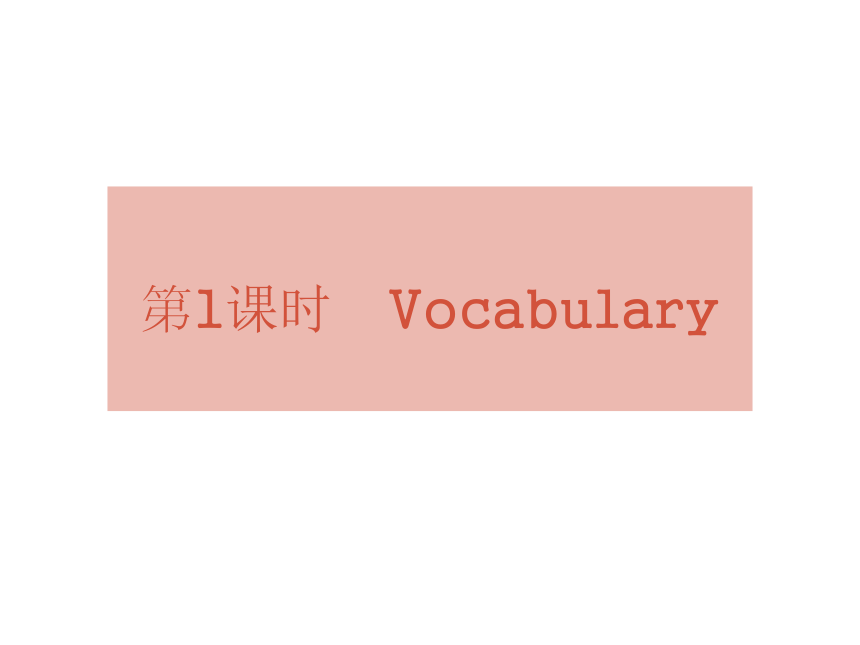
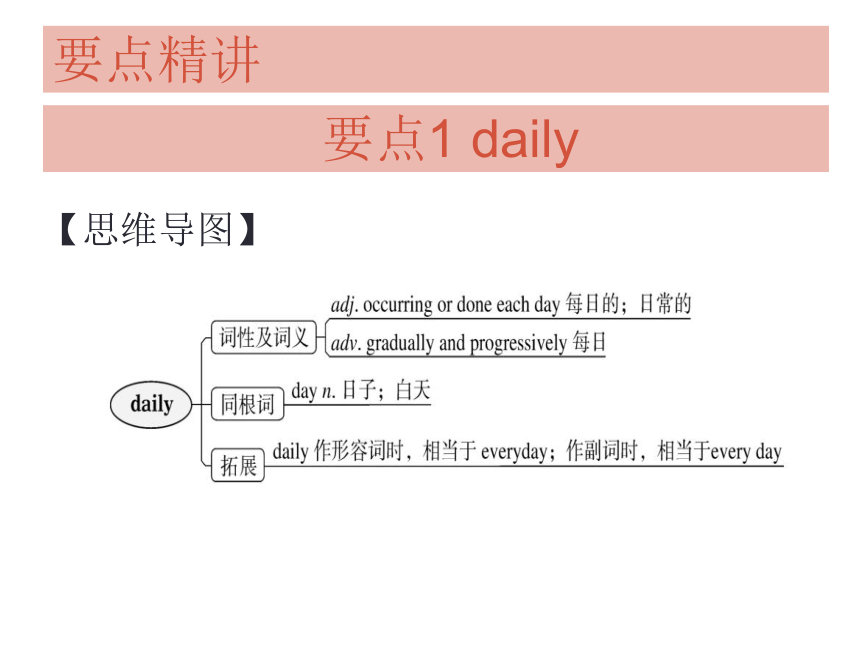
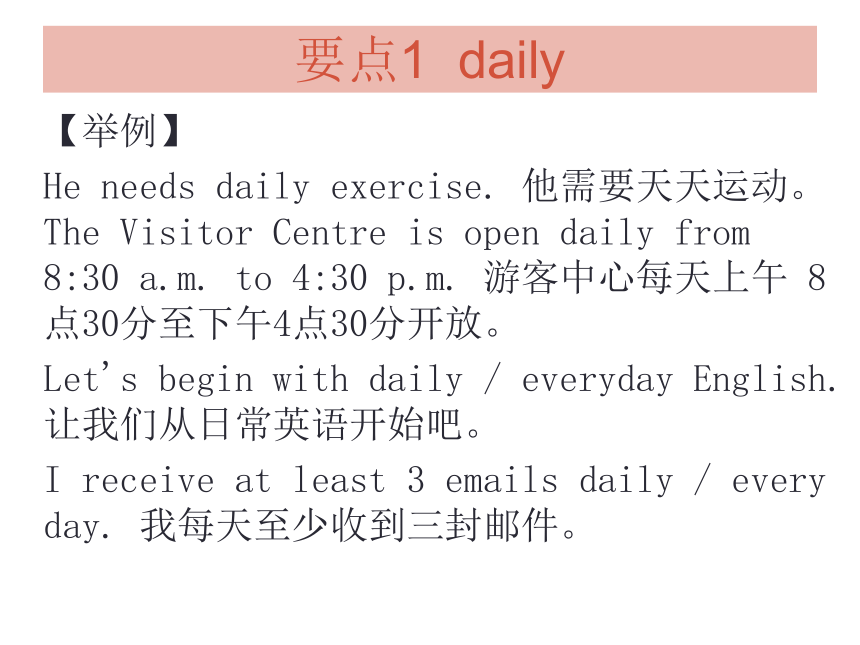
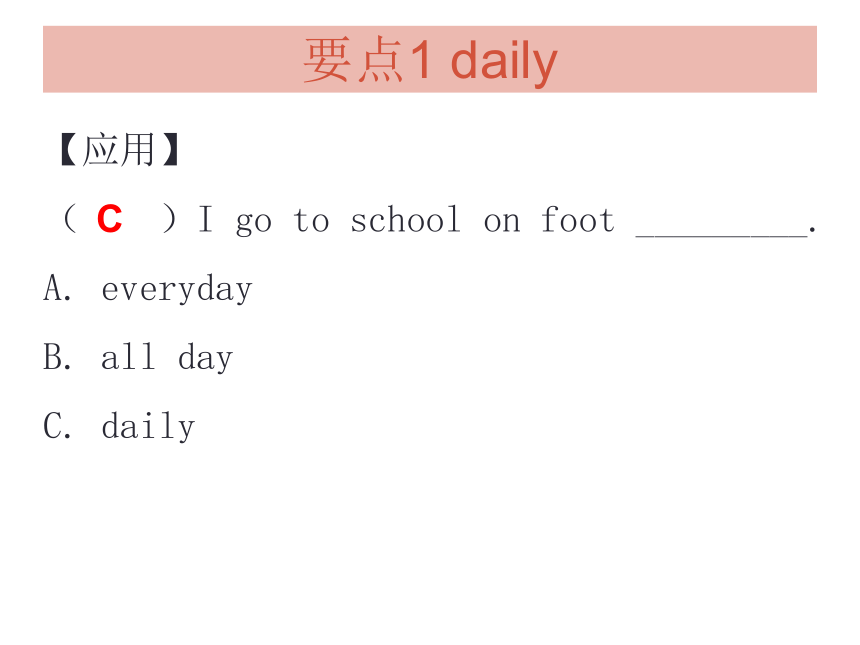
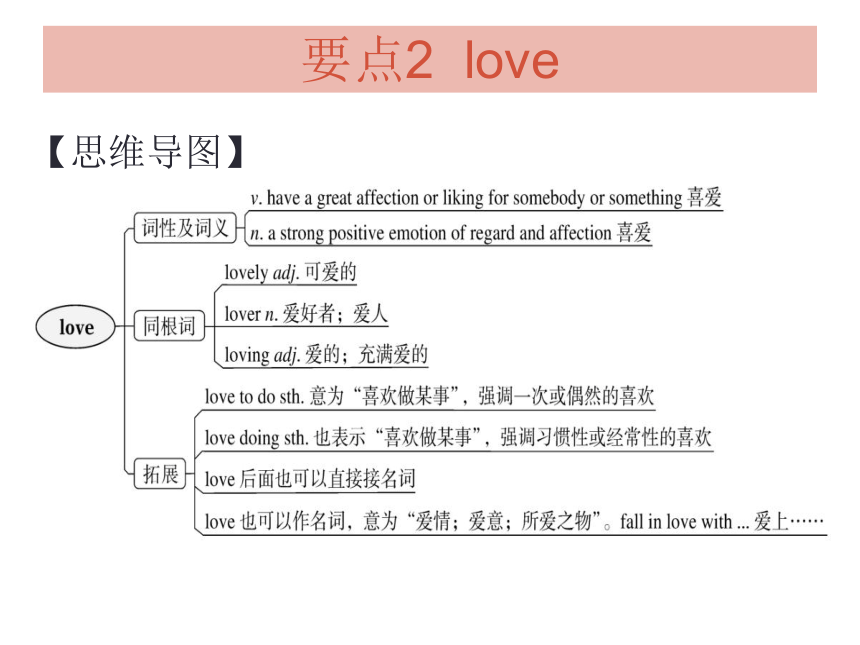
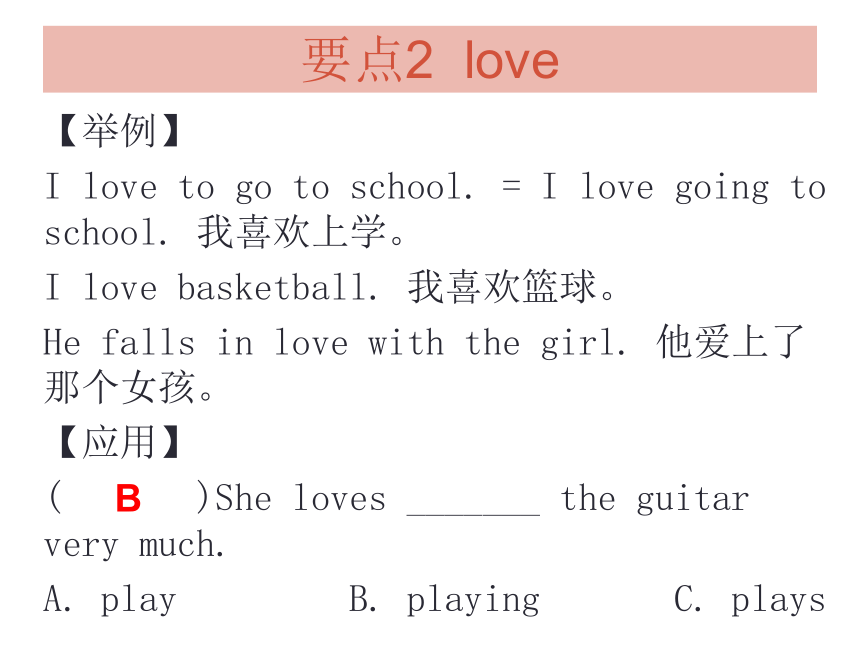
文档简介
课件88张PPT。Module 1 My life
Unit 2 Daily life知识导航关键词汇
1. 每日的;日常的 (adj.)___________
2. 文章(n.)______________
3. 从不 (adv.)______________
4. 乒乓球 (n.)______________
5. 骑;驾驶 (v.)______________
6. 通常地(adv.)______________
7. 因此;所以 (conj.)____________
8. 不常;很少 (adv.) ______________
9. 地理 (n.)______________dailyarticlenevertable tennisrideusuallysoseldomGeography
10. 休息 (n.)______________
11.钟;铃(n.)____________
12. (使)发出钟声,响起铃声 (v.)__________
13. 结束;终止 (v.)___________
14. 乐队 (n.)______________
15. 练习 (n.)______________
16. 在一起 (adv.) ______________
17. 集市;市场(n.)_____________
18. 吉他(n.)____________
19. 年级 (n.)_____________breakbellringendbandpracticetogethermarketguitargrade重要词组1. 一周一两次 ____________________
2. 初级中学 ____________________
3. 步行 ______________
4. 喜欢做某事 __________________________
5. 了解;学习 ______________
6. 参加 ______________
7. 过得愉快 ____________________
8. 去睡觉 ______________
9. 起床 ______________
10. 帮助某人做某事 ____________________once or twice a weekjunior high schoolon footenjoy doing sth. / love doing sth.learn abouthave a good timego to bedget uphelp sb. with sth. take part in典型句子1. 我是一名初中生。(junior high school)
___________________________________________
2. 我的学校离我的家很近,所以我总是走路去上学。(on foot)
______________________________________________________________________________________
3. 我很少迟到。(seldom)
___________________________________________
4. 我喜欢了解世界各地。(enjoy doing sth.)
___________________________________________
5. 我们上午9点50分早间休息。(morning break)
___________________________________________I am a junior high school student.My school is close to my home, so I always go to school on foot.I am seldom late.I enjoy learning about different places in the world.We have our morning break at 9:50 a.m.6. (课间)休息于10点10分结束。(end)
_________________________________________
7. 接着,汤姆、杰克和我参加了学校的乐队练习。(take part in)
__________________________________________________________________________________8. 我常常在学校过得很开心。(have a good time)
_________________________________________Break ends at 10:10 a.m.Then Tom, Jack and I take part in the school band practice.I always have a good time at school. 第1课时 Vocabulary 要点精讲 要点1 daily【思维导图】要点1 daily【举例】
He needs daily exercise. 他需要天天运动。The Visitor Centre is open daily from 8:30 a.m. to 4:30 p.m. 游客中心每天上午 8点30分至下午4点30分开放。
Let's begin with daily / everyday English. 让我们从日常英语开始吧。
I receive at least 3 emails daily / every day. 我每天至少收到三封邮件。要点1 daily【应用】
( )I go to school on foot _________.
A. everyday
B. all day
C. dailyC要点2 love【思维导图】要点2 love【举例】
I love to go to school. = I love going to school. 我喜欢上学。
I love basketball. 我喜欢篮球。
He falls in love with the girl. 他爱上了那个女孩。
【应用】
( )She loves _______ the guitar very much.
A. play B. playing C. playsB要点3 seldom【举例】
I seldom go to the cinema. 我很少去看电影。
I seldom / hardly / rarely read comic books. 我很少看漫画书。【思维导图】要点3 seldom【应用】
( )He lives close to his office, so he __________ goes to work by bus.
A. often
B. seldom
C. usuallyB要点4 enjoy【举例】
Students enjoy watching TV. 学生们喜欢看电视。
They enjoy themselves on the beach. 他们在海滩上玩得很高兴。【思维导图】要点4 enjoy【应用】
( )Do you enjoy _________?
A. go fish
B. go fishing
C. going fishingC要点5 end【思维导图】要点5 end【举例】
The class will end at 5 p.m. 这节课将在下午5点结束。
Walk to the end of the street. 走到这条路的尽头。
Do you know the ending of the story? 你知道这个故事的结局吗?
The endless noise makes me very angry. 无休止的噪音让我很生气。
You can find a shop at the end of the road. 在路的尽头你可以找到一家商店。
In the end / At last / Finally, you will understand me. 最终你会理解我的。要点5 end【应用】
(1) 选词组填空: at the end of, in the end
① We had a meeting _____________ last month.
② He found his key ______________.
(2) Not every fairy tale has a happy _____________ (end).at the end ofin the endending要点6 practice【思维导图】要点6 practice【举例】
You should do some more practice. 你应该再多做一些练习。
I practised running yesterday. 我昨天练习了跑步。
【应用】
(1)Learning a language needs a lot of ________(practise).
(2)She practises ________ (dance) after school every day.practicedancing要点7 remember【思维导图】要点7 remember【举例】
Remember to turn off the light when you leave the room. 当你离开房间的时候,记得关灯。
I remember turning off the light. 我记得关了灯了。
I forgot to bring my homework to school this morning. 我早上忘了带家庭作业来学校。要点7 remember【应用】
( )It's raining heavily outside, please remember _________ the windows.
A. close
B. to close
C. closingB要点8 help【思维导图】要点8 help【举例】
I helped them with this job. 我在这项工作上帮助过他们。
Susan helps her mother to clean the house. =Susan helps her mother clean the house.苏珊帮她妈妈打扫房间。
Thanks very much for your help.非常感谢你的帮助。要点8 help【应用】
( )Would you like to help me _____ my homework?
A. with do
B. do
C. to doingB课堂练习一、根据要求写出相应的单词或短语
1. usual _____________(adv.)
2. start _____________(反义词)
3. article _____________ (复数形式)
4. every day _____________ (同义词)
5. brush _____________(第三人称单数)
6. always _____________(反义词)usuallyendarticlesdailybrushesnever7. rest _____________(同义词)
8. ride _____________(第三人称单数)
9. 弹钢琴 _________________
10. 过得愉快 _____________________
11. 喜欢做…… _____________________
12. 到达 _____________breakridesplay the pianohave a good timelove / enjoy doing …arrive at / in二、词汇测试i. 从下面每小题的A、B、C三个选项中选出可以替换画线部分的最佳选项。( )1. —What did you do last weekend?
—We had a good time in Happy Valley.
A. enjoyed the time B. play games
C. enjoyed ourselves
( )2. —How many students in your class go to school on foot every day?
—30.
A. ride to school B. run to school
C. walk to school
C C
( )3. —Do you know Tony is Jack's best friend?
—Yes, they walk to school together every morning.
A. with each other B. as usual C. one by one
( )4. —When does Helen do her homework?
—She usually does her homework at 5:30 in the afternoon.
A. sometimes B. seldom C. most often
A C( )5. —Andy, can you tell me how to play the guitar well?
—Yes. If you want to play the guitar well, you must do a lot of practice.
A. money B. time C. exercise
( )6. —I plan to reach the airport at 10:00 a.m.
—It's too late. You had better arrive at the airport at 8:00 a.m.
A. go to B. get to C. leave for
CB( )7. —Linda's English is very good. How does she learn it?
—She reads English novels every day. Sometimes she learns it on the radio.
A. At times B. At present
C. At the moment
( )8. —When did Jim learn French?
—He started to learn French at the age of six.
A. began B. wanted C. hadA A( )9. A(n) _____ is a big place. People often buy and sell things in it.
A. bank B. office C. market
( )10. _____ is the exercise of doing something again and again.
A. Practice B. Time C. Sound
( )11. —Where are Tom and Mary?
—They are doing their homework _____ in the classroom.
A. alone B. together C. quickly
( )12. —What time do you usually _____ in the morning?
—At about 6:00. Then I take the subway to school.
A. go to bed B. get up C. go to classii. 根据句子意思,从下面每小题的A、B、C三个选项中选出恰当的词语完成句子。C A B B( )13. —It seems that all teachers like Lucy.
—Yes. She is one of the best students and she is _____ late for school.
A. often B. seldom C. sometimes
( )14. —Mary, would you like to _____ this game?
—I'd love to, but I have to practise _____ the panio.
A. join in;playing B. attend;playing C. join;to play
( )15. —I'm sorry to keep you waiting for me so long.
—_____.
A. I don't think so B. Don't say so
C. It doesn't matterB A C 第2课时 Reading 要点精讲【用法】(1)enjoy doing sth. 意为“喜欢做某事”,enjoy后面接的动词一定要用动名词形式,不能直接接动词不定式to do或do。
Students enjoy watching TV. 学生们喜欢看电视。
(2)learn about 意为“获悉;了解”。
They want to learn about Chinese culture. 他们想了解中国文化。
(3)different 意为“不同的”,反义词为same。different places in the world 意为“世界各地”。There are different ways to learn English. 学习英语有不同的方式。要点1 I enjoy learning about different places in the world. 我喜欢了解世界各地。要点1【拓展】
(1)enjoy doing sth.=like / love doing sth.,意为“喜欢做某事”。
(2)be different from意为“与……不同”。
【应用】
( ) He said his mother enjoyed _____.
A. to go shopping
B. go shopping
C. going shoppingC要点2 When the bell rings, I run to the playground with my best friends Tom and Jack. 当铃声响起的时候,我和我最好的朋友汤姆和杰克跑到操场上。 【用法】
(1)when在这句话中是一个连词,此处连接两个先后发生的动作,表示“当……的时候”,when引导的句子在功能上相当于一个时间状语,因此我们把这个句子叫作状语从句。由when引导的时间状语从句既能放在主句之后,也可以放在主句之前(用逗号隔开)。
He saw a bird when he opened the door. 当他打开门时,他看到了一只鸟。
When she was seven years old, she could play chess. 当她七岁时,她会下棋。要点2(2)ring表示“(使)发出钟声,响起铃声”。ring的过去式和过去分词分别为rang,rung。When the telephone rings, he goes inside the room. 当电话响起的时候,他走进房间。
【拓展】
ring作名词时,表示“电话;戒指;指环”,如:give sb. a ring 给某人打个电话
a magic ring 一枚魔戒
要点2【应用】
( )When the bell rings, I go to open the door. (选出可以替换画线部分的最佳选项)
A. makes a sound
B. is quiet
C. is brokenA课堂练习一、用所给单词的适当形式填空
1. I can learn a lot of things every day, so I love __________(go) to school.
2. We _________(usual)have two Chinese classes every day.
3. I enjoy _________(play) games with my best friends during the morning break.
4. Linda always _________ (have) a good time at school.
5. I often wash _________ (I) clothes by hands.goingusuallyplayinghasmy6. It takes a lot of __________ (practise) to play the piano well.
7. Do you remember __________(close) the door when you leave today?
8. I usually brush my __________ (tooth) in the morning.
9. Julie __________ (go) to bed at 10:30
p.m. every day.
10. My mother buys __________(day)newspaper every day.practiceto closeteethgoesdaily二、阅读理解 A mouse feels very bad because she can't find any food. She lives a hard life. She looks here and there, but she always has no food to eat, and she becomes very thin.
At last the mouse finds a basket, full of food. There is a small hole in the basket, and she can just get through the hole. She climbs in the hole of the basket happily. Then she begins to eat. She is so hungry that she eats a lot, and she becomes fat. After she eats, the mouse tries to climb out of the basket, but she can't. She is too fat to pass through the hole.
“How can I climb out?” says the mouse. “Oh, how can I climb out?”
Just then a rat comes along, and he hears the mouse.
“Greedy mouse,” says the rat, “If you want to climb out of the basket, you have to wait to become thin again in the basket.”
( )1. Why does the mouse climb into the basket?
A. Because she wants to eat the food in it.
B. Because she thinks the basket is full of food.
C. Because the basket is very interesting.
D. Because she wants to live in it.
( )2. What happens after the mouse eats a lot?
A. She gets sleepy.
B. The hole becomes small.
C. She can't get out of the basket.
D. A rat also comes into the hole.A C( )3. What can we know from the passage?
A. The mouse lives an easy life.
B. The mouse eats all the food.
C. The mouse lives a hard life.
D. The mouse knows how to come out of the basket.
( )4. Which of the following can be the best title for the passage?
A. The Full Rat
B. The Hungry Mouse
C. A Friendly Rat
D. A Clever MouseC B 第3课时 Grammar 语法聚焦一、频率副词
1. 频率副词是表示与次数、频率有关的副词。
常见的频率副词有:always (总是), usually (通常), often (经常), sometimes (有时), seldom (不常), rarely(极少), never (从不),once (一次), twice (两次)等。
I usually go out for a walk after supper. 我通常晚饭后出去散步。
He seldom goes out at night. 他很少晚上外出。
I do sports twice a week. 我一周做两次运动。语法聚焦2. 频率副词用在be动词、情态动词及助动词之后,行为动词之前。
She is always friendly to us. 她总是对我们很友好。
I can never forget that day. 我永远也不能忘掉那一天。
I have never been there. 我从没到过那里。
I sometimes go to school by bus.我有时乘公共汽车去上学。
语法聚焦二、一般现在时
1.表示经常性或习惯性的动作。
I get up at 6 a.m. every day. 我每天早晨6点起床。
2.表示现在的特征或状态。
The boy is kind to others. 这个男孩对别人友好。
3.表示普遍真理或客观事实。
The Earth goes around the Sun. 地球围绕太阳转。
语法聚焦4. 在时间状语从句和条件状语从句中,如果主句用将来时态,从句要用一般现在时。
I will climb the mountain if it is sunny tomorrow. 如果明天天晴,我就会去爬山。When he comes back, I will tell him the message. 当他回来的时候,我就告诉他这个消息。
语法聚焦5. 一般现在时的构成
(1) be动词的一般现在时的各种形式:语法聚焦语法聚焦举例:
I am a junior high school student. 我是一名初中生。
We are good friends. 我们是好朋友。
He is careful with his study. 他对学习很认真。
Sam is seldom late for school. 山姆上学很少迟到。
I am not good at playing football. 我不擅长踢足球。语法聚焦They are not in the classroom now. 他们现在不在教室里。
—Is Mary at home now? 玛丽现在在家吗?
—Yes, she is. / No, she isn't. 是的,她在。 /不,她不在。
What is your hobby? 你的爱好是什么?语法聚焦(2)行为动词的一般现在时的各种形式:语法聚焦语法聚焦举例:
I love going to school. 我喜欢去上学。
Sam doesn't go to school on Saturday. 山姆周六不去上学。
—Does it often rain in your city in summer? 你的城市夏天经常下雨吗?
—Yes, it does. / No, it doesn't. 是的,经常下。/ 不,不常下。
What do you often do after school? 放学后你经常做什么?
课堂练习一、用所给单词的适当形式填空
1. He often _________(have) dinner at home.
2. Daniel and Tommy _________ (be) in Class One.
3. We _______________ (not watch) TV on Mondays.
4. Uncle John _________(go) for a walk after supper every day.
5. ______they _____(like) the World Cup?hasaredon't watchgoesDolike6. What _________ they often _________ (do) on Saturdays?
7. _________ your parents ________(read) newspapers every day?
8. The girl _________(study) English on Sundays.
9. Mike _________(enjoy) cooking.
10. We will go shopping if it ___________ (not rain) tomorrow.dodoDoreadstudiesenjoysdoesn't rain二、选择填空( )1. —Would you like some green tea?
—No, thanks. I _________ drink green tea. It hurts my stomach. (2017南京)
A. almost B. seldom C. only D. still
( )2. —These people are really nice.
—Yes. They _________ show respect for our feelings. (2017沈阳)
A. seldom B. never
C. always D. alreadyB C( )3. Johnson won't answer the phone if he _________ the number. (2017广东)
A. knew B. doesn't know
C. will know D. didn't know
( )4. I _________ football quite well, but I haven't had time to play since the new year. (2017武汉)
A. will play B. have played
C. played D. play
( )5. The Earth is a planet and it _________ around the Sun. (2017天津)
A. goes B. go C. will go D. went B D A三、语法填空 Linda joins two clubs in her school. They are 1. ________ (she) favourite clubs, the Protecting Animals Club and the Protecting the Earth Club. She often
2. ________ (go) to the first one on Saturdays and goes to 3.________ other one on Sundays. In the Protecting Animals Club, she sometimes watches videos 4._______ rare (稀有的) animals. hergoestheaboutIf she 5. ____________ (not know) about the animals, she will 6. ________ (write) them down on a notebook. Sometimes, she goes to the nature reserve (自然保护区) to help the 7. ________ (worker) there. In the Protecting the Earth Club, she usually goes to 8. __________ (difference) streets and cleans the rubbish bins. And sometimes, she makes some posters and gives 9.________ (they) out to people. She hopes that they won't throw 10.______ rubbish everywhere.
doesn't know writeworkersdifferentthemaway 第4课时 Listening and speaking 口语无忧 本单元我们学习了如何谈论自己的日常生活。那么,现在让我们一起围绕“如何讲述自己的日常生活”这一话题展开口语练习吧!
话题二 如何讲述自己的日常生活
【1】相关词组(请大声朗读以下词汇,看谁读得更标准地道)junior, class, start, end, subject, interesting, Geography, History, remember, rich, colourful, experience, on weekends, have a good time,
after-school activities, enjoy doing, take part in,
relax oneself【2】你问我答
A. 请运用下列句子与你组内的一个同伴(四人小组)进行你问我答,然后互换角色,再进行问答。
1. Is your school close to your home?
2. How long does it take you to get to school?
3. When do classes start in the morning?
4. Do you have a morning break?
5. Where do you have lunch, at home or at school?
6. What is your favourite subject?
7. Who is your best friend?
8. What do you usually do after school?
9. When do you usually begin to do your homework?
10. What do you think of your school life?
B. 接下来,在小组内换一个同伴互相问答。
【3】情景说话
A: Hi, Frank. Can you tell me something about your daily life?
B: Hi, Andy. Yes.
A: When do you get up every day?
B: I always get up at 6 o'clock.
A: When do you usually have breakfast?
B: I usually have breakfast at 7:30 a.m. And I often have porridge.
A: Is your school close to your home?
B: Yes. So I walk to school.
A: How long does it take you to get to school?
B: It usually takes me about 15 minutes to get to school.
…
接下来,请你向全班同学介绍你自己的日常生活情况。
Report like this:
Hi, everyone. I'm Frank.________________
_______________________________________________________________________________________________________________________________________
______________________________________________________________________________________________________________________________________________________________________________________________________________________________________________________________________________ Now, let me tell you something about my daily life. I get up at 6 o'clock every day. At 7:30 a.m., I have breakfast. I often have porridge. My home is close to my school, so I usually walk to school at 7:45 a.m. It takes me about 15 minutes to get to school. I have lunch at school. After school, I usually play basketball with my friends. I go home at about 5 p.m. I usually have dinner at 6:30 p.m. After dinner, I finish my homework. I always go to bed at 9:30 p.m.课堂练习一、用所给单词或词组的适当形式补全对话
A:Excuse me. Can I ask you 1. __________________?
B: Sure.
A: 2.________ do you usually get to school?
B: At 7:00.
A: How many 3.____________ do you have?
B: Seven.
some questionsWhensubjectswhen which play the piano well some qustions subjectA: 4. ________ do you like best?
B: I like Maths best. I think it is very interesting.
A: Do you like Music?
B: Yes, I can 5._____________________.
A: You are great.
Whichplay the piano well二、思维导图复述根据教材P17的课文内容完成下面的思维导图,再根据思维导图,复述该篇课文的内容。footChinese, Maths and English11:50 a.m.12:30 p.m.school band practice with Tom and Jackgood time课文复述:
___________________________________________________________________________________________________________________________
______________________________________________________________________________________________________________________________________________________________________________________________________________________________________________________
Sam goes to school on foot every day. In the morning, he learns Chinese, Maths and English. During the morning break, Sam plays games with his friends. Lunchtime is from 11:50 a.m. to 12:30 p.m. Afternoon classes end at 3:30 p.m. After school, he takes part in the school band practice with Tom and Jack. Sam has a good time at school.
第5课时 Writing 写作乐园话题二 介绍日常生活
【短文写作】
课堂上,同学们正在讨论各自的日常生活,你的日常生活是怎样的呢?请你写一篇短文,描述一下你的日常生活。
作文要求:语意连贯,条理清楚,60字左右。
____________________________________________________________________________________________________________________________________________________________________【写作指导】 此篇作文以介绍日常生活为主线,主要内容是谈论日常生活。写作内容渗透着本单元的话题和语言目标——谈论某人的日常生活。
在写作过程中要明确以下几点:
1. 由作文要谈及的主要内容决定我们在写作中要运用“sb. do(es) sth. at+具体时间”的句型结构,涉及日常生活的固定搭配等等。
2. 结合话题内容,我们在写作过程中要大量用到有关日常生活的短语。【范文赏析】 I get up at six every day. I dress myself quickly and have breakfast at half past six. After breakfast I go to school.
I have four lessons in the morning and three in the afternoon. I study hard and I always help my classmates with their lessons. I have lunch at school. School is over at five. After school, I sometimes play badminton with my classmates in the school.
I get home at about six. After supper I read newspapers or watch TV for half an hour. I do my homework and prepare my lessons between half past seven and nine. I go to bed at half past nine. This is my daily life.
课堂练习一、写作仿写
1. help sb. (to) do sth.帮助某人做某事
【例句】I help him (to) repair his bike. 我帮他修自行车。
【扩展】help sb. with sth.帮助某人做某事
【仿写】(汉译英)
(1)我经常帮助我的妈妈做家务。
______________________________________
(2)放学后,我帮助同学打扫教室。
______________________________________
______________________________________I often help my mother(to) do housework.After school, I help my classmates(to) clean the classroom.2. arrive at 到达(后面接小地方)
【例句】He arrives at his office early every day. 他每天很早到办公室。
【扩展】arrive in 到达(后面接大地方);arrive at = reach = get to 到达
【仿写】(汉译英)
(1)我每天很早到学校。
______________________________________
(2)他早上到达了深圳。
______________________________________I arrive at school early every day.He arrived in Shenzhen in the morning.3. have a good time 过得愉快
【例句】We can just hang out and have a good time. 我们可以只是闲逛一下,开开心。
【扩展】have a good / great / wonderful time = enjoy oneself = have fun 过得愉快
【仿写】(汉译英)
(1)我们会玩得很开心的。
______________________________________
(2)他们在一起度过了一段愉快的时光。
______________________________________We'll have a good time. They had a good time together.二、书面表达 假如你是《中英友谊报》的小记者,你想向英国的小朋友介绍深圳中学生的日常生活,为此你采访了一名深圳的中学生张强。请你根据以下采访信息写一篇文章。
采访信息:
1. 早上6点起床,朗读英语15分钟,吃早餐,7点钟出门上学。
2. 上午上5节课,回家吃午饭。
3.下午2点半上课,上4节课,其中最后一节课是课外活动课,放学后,坐公交车回家。
4. 晚上看半小时电视之后,做两小时的作业,9点半上床睡觉。
作文要求:
1.词数:60词左右(标题和开头已给出,不计入总词数)。
2.文章必须包含所有提示内容,并可作适当发挥。
3.条理清楚,语句通顺,意思连贯,书写规范。
参考词汇:课外活动after-school activity
Zhang Qiang's Daily Life
Zhang Qiang is a junior high school student in Shenzhen. _________________________
______________________________________________________________________________________________________________________________________________________________________________________________________________________________________________________________________________________________________________________________________________________________________________________________________________________________ He gets up at six every day and reads English for 15 minutes. Then he has breakfast. He goes to school at 7 o'clock. He has five lessons in the morning. Then he goes home to have lunch. In the afternoon, he has four lessons. Classes begin at 2:30 p.m. and the last class is for after-school activities. He goes home by bus after school. In the evening, Zhang Qiang often watches TV for half an hour and then he does his homework for two hours. He always goes to bed at 9:30 p.m.
Thank you!
1. 每日的;日常的 (adj.)___________
2. 文章(n.)______________
3. 从不 (adv.)______________
4. 乒乓球 (n.)______________
5. 骑;驾驶 (v.)______________
6. 通常地(adv.)______________
7. 因此;所以 (conj.)____________
8. 不常;很少 (adv.) ______________
9. 地理 (n.)______________dailyarticlenevertable tennisrideusuallysoseldomGeography
10. 休息 (n.)______________
11.钟;铃(n.)____________
12. (使)发出钟声,响起铃声 (v.)__________
13. 结束;终止 (v.)___________
14. 乐队 (n.)______________
15. 练习 (n.)______________
16. 在一起 (adv.) ______________
17. 集市;市场(n.)_____________
18. 吉他(n.)____________
19. 年级 (n.)_____________breakbellringendbandpracticetogethermarketguitargrade重要词组1. 一周一两次 ____________________
2. 初级中学 ____________________
3. 步行 ______________
4. 喜欢做某事 __________________________
5. 了解;学习 ______________
6. 参加 ______________
7. 过得愉快 ____________________
8. 去睡觉 ______________
9. 起床 ______________
10. 帮助某人做某事 ____________________once or twice a weekjunior high schoolon footenjoy doing sth. / love doing sth.learn abouthave a good timego to bedget uphelp sb. with sth. take part in典型句子1. 我是一名初中生。(junior high school)
___________________________________________
2. 我的学校离我的家很近,所以我总是走路去上学。(on foot)
______________________________________________________________________________________
3. 我很少迟到。(seldom)
___________________________________________
4. 我喜欢了解世界各地。(enjoy doing sth.)
___________________________________________
5. 我们上午9点50分早间休息。(morning break)
___________________________________________I am a junior high school student.My school is close to my home, so I always go to school on foot.I am seldom late.I enjoy learning about different places in the world.We have our morning break at 9:50 a.m.6. (课间)休息于10点10分结束。(end)
_________________________________________
7. 接着,汤姆、杰克和我参加了学校的乐队练习。(take part in)
__________________________________________________________________________________8. 我常常在学校过得很开心。(have a good time)
_________________________________________Break ends at 10:10 a.m.Then Tom, Jack and I take part in the school band practice.I always have a good time at school. 第1课时 Vocabulary 要点精讲 要点1 daily【思维导图】要点1 daily【举例】
He needs daily exercise. 他需要天天运动。The Visitor Centre is open daily from 8:30 a.m. to 4:30 p.m. 游客中心每天上午 8点30分至下午4点30分开放。
Let's begin with daily / everyday English. 让我们从日常英语开始吧。
I receive at least 3 emails daily / every day. 我每天至少收到三封邮件。要点1 daily【应用】
( )I go to school on foot _________.
A. everyday
B. all day
C. dailyC要点2 love【思维导图】要点2 love【举例】
I love to go to school. = I love going to school. 我喜欢上学。
I love basketball. 我喜欢篮球。
He falls in love with the girl. 他爱上了那个女孩。
【应用】
( )She loves _______ the guitar very much.
A. play B. playing C. playsB要点3 seldom【举例】
I seldom go to the cinema. 我很少去看电影。
I seldom / hardly / rarely read comic books. 我很少看漫画书。【思维导图】要点3 seldom【应用】
( )He lives close to his office, so he __________ goes to work by bus.
A. often
B. seldom
C. usuallyB要点4 enjoy【举例】
Students enjoy watching TV. 学生们喜欢看电视。
They enjoy themselves on the beach. 他们在海滩上玩得很高兴。【思维导图】要点4 enjoy【应用】
( )Do you enjoy _________?
A. go fish
B. go fishing
C. going fishingC要点5 end【思维导图】要点5 end【举例】
The class will end at 5 p.m. 这节课将在下午5点结束。
Walk to the end of the street. 走到这条路的尽头。
Do you know the ending of the story? 你知道这个故事的结局吗?
The endless noise makes me very angry. 无休止的噪音让我很生气。
You can find a shop at the end of the road. 在路的尽头你可以找到一家商店。
In the end / At last / Finally, you will understand me. 最终你会理解我的。要点5 end【应用】
(1) 选词组填空: at the end of, in the end
① We had a meeting _____________ last month.
② He found his key ______________.
(2) Not every fairy tale has a happy _____________ (end).at the end ofin the endending要点6 practice【思维导图】要点6 practice【举例】
You should do some more practice. 你应该再多做一些练习。
I practised running yesterday. 我昨天练习了跑步。
【应用】
(1)Learning a language needs a lot of ________(practise).
(2)She practises ________ (dance) after school every day.practicedancing要点7 remember【思维导图】要点7 remember【举例】
Remember to turn off the light when you leave the room. 当你离开房间的时候,记得关灯。
I remember turning off the light. 我记得关了灯了。
I forgot to bring my homework to school this morning. 我早上忘了带家庭作业来学校。要点7 remember【应用】
( )It's raining heavily outside, please remember _________ the windows.
A. close
B. to close
C. closingB要点8 help【思维导图】要点8 help【举例】
I helped them with this job. 我在这项工作上帮助过他们。
Susan helps her mother to clean the house. =Susan helps her mother clean the house.苏珊帮她妈妈打扫房间。
Thanks very much for your help.非常感谢你的帮助。要点8 help【应用】
( )Would you like to help me _____ my homework?
A. with do
B. do
C. to doingB课堂练习一、根据要求写出相应的单词或短语
1. usual _____________(adv.)
2. start _____________(反义词)
3. article _____________ (复数形式)
4. every day _____________ (同义词)
5. brush _____________(第三人称单数)
6. always _____________(反义词)usuallyendarticlesdailybrushesnever7. rest _____________(同义词)
8. ride _____________(第三人称单数)
9. 弹钢琴 _________________
10. 过得愉快 _____________________
11. 喜欢做…… _____________________
12. 到达 _____________breakridesplay the pianohave a good timelove / enjoy doing …arrive at / in二、词汇测试i. 从下面每小题的A、B、C三个选项中选出可以替换画线部分的最佳选项。( )1. —What did you do last weekend?
—We had a good time in Happy Valley.
A. enjoyed the time B. play games
C. enjoyed ourselves
( )2. —How many students in your class go to school on foot every day?
—30.
A. ride to school B. run to school
C. walk to school
C C
( )3. —Do you know Tony is Jack's best friend?
—Yes, they walk to school together every morning.
A. with each other B. as usual C. one by one
( )4. —When does Helen do her homework?
—She usually does her homework at 5:30 in the afternoon.
A. sometimes B. seldom C. most often
A C( )5. —Andy, can you tell me how to play the guitar well?
—Yes. If you want to play the guitar well, you must do a lot of practice.
A. money B. time C. exercise
( )6. —I plan to reach the airport at 10:00 a.m.
—It's too late. You had better arrive at the airport at 8:00 a.m.
A. go to B. get to C. leave for
CB( )7. —Linda's English is very good. How does she learn it?
—She reads English novels every day. Sometimes she learns it on the radio.
A. At times B. At present
C. At the moment
( )8. —When did Jim learn French?
—He started to learn French at the age of six.
A. began B. wanted C. hadA A( )9. A(n) _____ is a big place. People often buy and sell things in it.
A. bank B. office C. market
( )10. _____ is the exercise of doing something again and again.
A. Practice B. Time C. Sound
( )11. —Where are Tom and Mary?
—They are doing their homework _____ in the classroom.
A. alone B. together C. quickly
( )12. —What time do you usually _____ in the morning?
—At about 6:00. Then I take the subway to school.
A. go to bed B. get up C. go to classii. 根据句子意思,从下面每小题的A、B、C三个选项中选出恰当的词语完成句子。C A B B( )13. —It seems that all teachers like Lucy.
—Yes. She is one of the best students and she is _____ late for school.
A. often B. seldom C. sometimes
( )14. —Mary, would you like to _____ this game?
—I'd love to, but I have to practise _____ the panio.
A. join in;playing B. attend;playing C. join;to play
( )15. —I'm sorry to keep you waiting for me so long.
—_____.
A. I don't think so B. Don't say so
C. It doesn't matterB A C 第2课时 Reading 要点精讲【用法】(1)enjoy doing sth. 意为“喜欢做某事”,enjoy后面接的动词一定要用动名词形式,不能直接接动词不定式to do或do。
Students enjoy watching TV. 学生们喜欢看电视。
(2)learn about 意为“获悉;了解”。
They want to learn about Chinese culture. 他们想了解中国文化。
(3)different 意为“不同的”,反义词为same。different places in the world 意为“世界各地”。There are different ways to learn English. 学习英语有不同的方式。要点1 I enjoy learning about different places in the world. 我喜欢了解世界各地。要点1【拓展】
(1)enjoy doing sth.=like / love doing sth.,意为“喜欢做某事”。
(2)be different from意为“与……不同”。
【应用】
( ) He said his mother enjoyed _____.
A. to go shopping
B. go shopping
C. going shoppingC要点2 When the bell rings, I run to the playground with my best friends Tom and Jack. 当铃声响起的时候,我和我最好的朋友汤姆和杰克跑到操场上。 【用法】
(1)when在这句话中是一个连词,此处连接两个先后发生的动作,表示“当……的时候”,when引导的句子在功能上相当于一个时间状语,因此我们把这个句子叫作状语从句。由when引导的时间状语从句既能放在主句之后,也可以放在主句之前(用逗号隔开)。
He saw a bird when he opened the door. 当他打开门时,他看到了一只鸟。
When she was seven years old, she could play chess. 当她七岁时,她会下棋。要点2(2)ring表示“(使)发出钟声,响起铃声”。ring的过去式和过去分词分别为rang,rung。When the telephone rings, he goes inside the room. 当电话响起的时候,他走进房间。
【拓展】
ring作名词时,表示“电话;戒指;指环”,如:give sb. a ring 给某人打个电话
a magic ring 一枚魔戒
要点2【应用】
( )When the bell rings, I go to open the door. (选出可以替换画线部分的最佳选项)
A. makes a sound
B. is quiet
C. is brokenA课堂练习一、用所给单词的适当形式填空
1. I can learn a lot of things every day, so I love __________(go) to school.
2. We _________(usual)have two Chinese classes every day.
3. I enjoy _________(play) games with my best friends during the morning break.
4. Linda always _________ (have) a good time at school.
5. I often wash _________ (I) clothes by hands.goingusuallyplayinghasmy6. It takes a lot of __________ (practise) to play the piano well.
7. Do you remember __________(close) the door when you leave today?
8. I usually brush my __________ (tooth) in the morning.
9. Julie __________ (go) to bed at 10:30
p.m. every day.
10. My mother buys __________(day)newspaper every day.practiceto closeteethgoesdaily二、阅读理解 A mouse feels very bad because she can't find any food. She lives a hard life. She looks here and there, but she always has no food to eat, and she becomes very thin.
At last the mouse finds a basket, full of food. There is a small hole in the basket, and she can just get through the hole. She climbs in the hole of the basket happily. Then she begins to eat. She is so hungry that she eats a lot, and she becomes fat. After she eats, the mouse tries to climb out of the basket, but she can't. She is too fat to pass through the hole.
“How can I climb out?” says the mouse. “Oh, how can I climb out?”
Just then a rat comes along, and he hears the mouse.
“Greedy mouse,” says the rat, “If you want to climb out of the basket, you have to wait to become thin again in the basket.”
( )1. Why does the mouse climb into the basket?
A. Because she wants to eat the food in it.
B. Because she thinks the basket is full of food.
C. Because the basket is very interesting.
D. Because she wants to live in it.
( )2. What happens after the mouse eats a lot?
A. She gets sleepy.
B. The hole becomes small.
C. She can't get out of the basket.
D. A rat also comes into the hole.A C( )3. What can we know from the passage?
A. The mouse lives an easy life.
B. The mouse eats all the food.
C. The mouse lives a hard life.
D. The mouse knows how to come out of the basket.
( )4. Which of the following can be the best title for the passage?
A. The Full Rat
B. The Hungry Mouse
C. A Friendly Rat
D. A Clever MouseC B 第3课时 Grammar 语法聚焦一、频率副词
1. 频率副词是表示与次数、频率有关的副词。
常见的频率副词有:always (总是), usually (通常), often (经常), sometimes (有时), seldom (不常), rarely(极少), never (从不),once (一次), twice (两次)等。
I usually go out for a walk after supper. 我通常晚饭后出去散步。
He seldom goes out at night. 他很少晚上外出。
I do sports twice a week. 我一周做两次运动。语法聚焦2. 频率副词用在be动词、情态动词及助动词之后,行为动词之前。
She is always friendly to us. 她总是对我们很友好。
I can never forget that day. 我永远也不能忘掉那一天。
I have never been there. 我从没到过那里。
I sometimes go to school by bus.我有时乘公共汽车去上学。
语法聚焦二、一般现在时
1.表示经常性或习惯性的动作。
I get up at 6 a.m. every day. 我每天早晨6点起床。
2.表示现在的特征或状态。
The boy is kind to others. 这个男孩对别人友好。
3.表示普遍真理或客观事实。
The Earth goes around the Sun. 地球围绕太阳转。
语法聚焦4. 在时间状语从句和条件状语从句中,如果主句用将来时态,从句要用一般现在时。
I will climb the mountain if it is sunny tomorrow. 如果明天天晴,我就会去爬山。When he comes back, I will tell him the message. 当他回来的时候,我就告诉他这个消息。
语法聚焦5. 一般现在时的构成
(1) be动词的一般现在时的各种形式:语法聚焦语法聚焦举例:
I am a junior high school student. 我是一名初中生。
We are good friends. 我们是好朋友。
He is careful with his study. 他对学习很认真。
Sam is seldom late for school. 山姆上学很少迟到。
I am not good at playing football. 我不擅长踢足球。语法聚焦They are not in the classroom now. 他们现在不在教室里。
—Is Mary at home now? 玛丽现在在家吗?
—Yes, she is. / No, she isn't. 是的,她在。 /不,她不在。
What is your hobby? 你的爱好是什么?语法聚焦(2)行为动词的一般现在时的各种形式:语法聚焦语法聚焦举例:
I love going to school. 我喜欢去上学。
Sam doesn't go to school on Saturday. 山姆周六不去上学。
—Does it often rain in your city in summer? 你的城市夏天经常下雨吗?
—Yes, it does. / No, it doesn't. 是的,经常下。/ 不,不常下。
What do you often do after school? 放学后你经常做什么?
课堂练习一、用所给单词的适当形式填空
1. He often _________(have) dinner at home.
2. Daniel and Tommy _________ (be) in Class One.
3. We _______________ (not watch) TV on Mondays.
4. Uncle John _________(go) for a walk after supper every day.
5. ______they _____(like) the World Cup?hasaredon't watchgoesDolike6. What _________ they often _________ (do) on Saturdays?
7. _________ your parents ________(read) newspapers every day?
8. The girl _________(study) English on Sundays.
9. Mike _________(enjoy) cooking.
10. We will go shopping if it ___________ (not rain) tomorrow.dodoDoreadstudiesenjoysdoesn't rain二、选择填空( )1. —Would you like some green tea?
—No, thanks. I _________ drink green tea. It hurts my stomach. (2017南京)
A. almost B. seldom C. only D. still
( )2. —These people are really nice.
—Yes. They _________ show respect for our feelings. (2017沈阳)
A. seldom B. never
C. always D. alreadyB C( )3. Johnson won't answer the phone if he _________ the number. (2017广东)
A. knew B. doesn't know
C. will know D. didn't know
( )4. I _________ football quite well, but I haven't had time to play since the new year. (2017武汉)
A. will play B. have played
C. played D. play
( )5. The Earth is a planet and it _________ around the Sun. (2017天津)
A. goes B. go C. will go D. went B D A三、语法填空 Linda joins two clubs in her school. They are 1. ________ (she) favourite clubs, the Protecting Animals Club and the Protecting the Earth Club. She often
2. ________ (go) to the first one on Saturdays and goes to 3.________ other one on Sundays. In the Protecting Animals Club, she sometimes watches videos 4._______ rare (稀有的) animals. hergoestheaboutIf she 5. ____________ (not know) about the animals, she will 6. ________ (write) them down on a notebook. Sometimes, she goes to the nature reserve (自然保护区) to help the 7. ________ (worker) there. In the Protecting the Earth Club, she usually goes to 8. __________ (difference) streets and cleans the rubbish bins. And sometimes, she makes some posters and gives 9.________ (they) out to people. She hopes that they won't throw 10.______ rubbish everywhere.
doesn't know writeworkersdifferentthemaway 第4课时 Listening and speaking 口语无忧 本单元我们学习了如何谈论自己的日常生活。那么,现在让我们一起围绕“如何讲述自己的日常生活”这一话题展开口语练习吧!
话题二 如何讲述自己的日常生活
【1】相关词组(请大声朗读以下词汇,看谁读得更标准地道)junior, class, start, end, subject, interesting, Geography, History, remember, rich, colourful, experience, on weekends, have a good time,
after-school activities, enjoy doing, take part in,
relax oneself【2】你问我答
A. 请运用下列句子与你组内的一个同伴(四人小组)进行你问我答,然后互换角色,再进行问答。
1. Is your school close to your home?
2. How long does it take you to get to school?
3. When do classes start in the morning?
4. Do you have a morning break?
5. Where do you have lunch, at home or at school?
6. What is your favourite subject?
7. Who is your best friend?
8. What do you usually do after school?
9. When do you usually begin to do your homework?
10. What do you think of your school life?
B. 接下来,在小组内换一个同伴互相问答。
【3】情景说话
A: Hi, Frank. Can you tell me something about your daily life?
B: Hi, Andy. Yes.
A: When do you get up every day?
B: I always get up at 6 o'clock.
A: When do you usually have breakfast?
B: I usually have breakfast at 7:30 a.m. And I often have porridge.
A: Is your school close to your home?
B: Yes. So I walk to school.
A: How long does it take you to get to school?
B: It usually takes me about 15 minutes to get to school.
…
接下来,请你向全班同学介绍你自己的日常生活情况。
Report like this:
Hi, everyone. I'm Frank.________________
_______________________________________________________________________________________________________________________________________
______________________________________________________________________________________________________________________________________________________________________________________________________________________________________________________________________________ Now, let me tell you something about my daily life. I get up at 6 o'clock every day. At 7:30 a.m., I have breakfast. I often have porridge. My home is close to my school, so I usually walk to school at 7:45 a.m. It takes me about 15 minutes to get to school. I have lunch at school. After school, I usually play basketball with my friends. I go home at about 5 p.m. I usually have dinner at 6:30 p.m. After dinner, I finish my homework. I always go to bed at 9:30 p.m.课堂练习一、用所给单词或词组的适当形式补全对话
A:Excuse me. Can I ask you 1. __________________?
B: Sure.
A: 2.________ do you usually get to school?
B: At 7:00.
A: How many 3.____________ do you have?
B: Seven.
some questionsWhensubjectswhen which play the piano well some qustions subjectA: 4. ________ do you like best?
B: I like Maths best. I think it is very interesting.
A: Do you like Music?
B: Yes, I can 5._____________________.
A: You are great.
Whichplay the piano well二、思维导图复述根据教材P17的课文内容完成下面的思维导图,再根据思维导图,复述该篇课文的内容。footChinese, Maths and English11:50 a.m.12:30 p.m.school band practice with Tom and Jackgood time课文复述:
___________________________________________________________________________________________________________________________
______________________________________________________________________________________________________________________________________________________________________________________________________________________________________________________
Sam goes to school on foot every day. In the morning, he learns Chinese, Maths and English. During the morning break, Sam plays games with his friends. Lunchtime is from 11:50 a.m. to 12:30 p.m. Afternoon classes end at 3:30 p.m. After school, he takes part in the school band practice with Tom and Jack. Sam has a good time at school.
第5课时 Writing 写作乐园话题二 介绍日常生活
【短文写作】
课堂上,同学们正在讨论各自的日常生活,你的日常生活是怎样的呢?请你写一篇短文,描述一下你的日常生活。
作文要求:语意连贯,条理清楚,60字左右。
____________________________________________________________________________________________________________________________________________________________________【写作指导】 此篇作文以介绍日常生活为主线,主要内容是谈论日常生活。写作内容渗透着本单元的话题和语言目标——谈论某人的日常生活。
在写作过程中要明确以下几点:
1. 由作文要谈及的主要内容决定我们在写作中要运用“sb. do(es) sth. at+具体时间”的句型结构,涉及日常生活的固定搭配等等。
2. 结合话题内容,我们在写作过程中要大量用到有关日常生活的短语。【范文赏析】 I get up at six every day. I dress myself quickly and have breakfast at half past six. After breakfast I go to school.
I have four lessons in the morning and three in the afternoon. I study hard and I always help my classmates with their lessons. I have lunch at school. School is over at five. After school, I sometimes play badminton with my classmates in the school.
I get home at about six. After supper I read newspapers or watch TV for half an hour. I do my homework and prepare my lessons between half past seven and nine. I go to bed at half past nine. This is my daily life.
课堂练习一、写作仿写
1. help sb. (to) do sth.帮助某人做某事
【例句】I help him (to) repair his bike. 我帮他修自行车。
【扩展】help sb. with sth.帮助某人做某事
【仿写】(汉译英)
(1)我经常帮助我的妈妈做家务。
______________________________________
(2)放学后,我帮助同学打扫教室。
______________________________________
______________________________________I often help my mother(to) do housework.After school, I help my classmates(to) clean the classroom.2. arrive at 到达(后面接小地方)
【例句】He arrives at his office early every day. 他每天很早到办公室。
【扩展】arrive in 到达(后面接大地方);arrive at = reach = get to 到达
【仿写】(汉译英)
(1)我每天很早到学校。
______________________________________
(2)他早上到达了深圳。
______________________________________I arrive at school early every day.He arrived in Shenzhen in the morning.3. have a good time 过得愉快
【例句】We can just hang out and have a good time. 我们可以只是闲逛一下,开开心。
【扩展】have a good / great / wonderful time = enjoy oneself = have fun 过得愉快
【仿写】(汉译英)
(1)我们会玩得很开心的。
______________________________________
(2)他们在一起度过了一段愉快的时光。
______________________________________We'll have a good time. They had a good time together.二、书面表达 假如你是《中英友谊报》的小记者,你想向英国的小朋友介绍深圳中学生的日常生活,为此你采访了一名深圳的中学生张强。请你根据以下采访信息写一篇文章。
采访信息:
1. 早上6点起床,朗读英语15分钟,吃早餐,7点钟出门上学。
2. 上午上5节课,回家吃午饭。
3.下午2点半上课,上4节课,其中最后一节课是课外活动课,放学后,坐公交车回家。
4. 晚上看半小时电视之后,做两小时的作业,9点半上床睡觉。
作文要求:
1.词数:60词左右(标题和开头已给出,不计入总词数)。
2.文章必须包含所有提示内容,并可作适当发挥。
3.条理清楚,语句通顺,意思连贯,书写规范。
参考词汇:课外活动after-school activity
Zhang Qiang's Daily Life
Zhang Qiang is a junior high school student in Shenzhen. _________________________
______________________________________________________________________________________________________________________________________________________________________________________________________________________________________________________________________________________________________________________________________________________________________________________________________________________________ He gets up at six every day and reads English for 15 minutes. Then he has breakfast. He goes to school at 7 o'clock. He has five lessons in the morning. Then he goes home to have lunch. In the afternoon, he has four lessons. Classes begin at 2:30 p.m. and the last class is for after-school activities. He goes home by bus after school. In the evening, Zhang Qiang often watches TV for half an hour and then he does his homework for two hours. He always goes to bed at 9:30 p.m.
Thank you!
